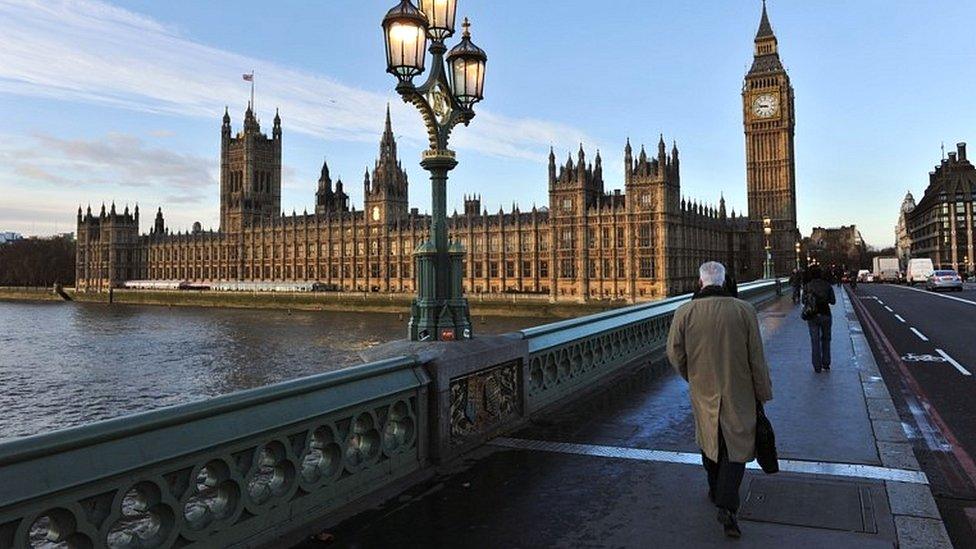What's happening in Parliament this week?
- Published

Thoughtful peers will spend the week gift-wrapping a series of treats for MPs when they return to Westminster after their Easter break - lots of lovely amendments to big government bills, which they will have to accept or reject in the dying days of the current session of Parliament.
Major issues around the Social Care Cost Cap (Health and Care Bill), the treatment of asylum seekers (Nationality and Borders Bill) and whether voters have to show ID at polling stations (Elections Bill) are in play.
And if peers do fire back on those issues, they will add to their recent rewriting of government proposals to restrict noisy protests (Police, Crime, Sentencing and Courts Bill) which already await the attention of the Commons.
The timeline is important here. The House of Lords sits until Thursday 7 April, while the Commons is already in recess and will be until 19 April.
So MPs can start considering all those Lords amendments in the three days on which they will sit in the week after Easter, but their lordships will not return to Parliament until the following week, beginning 25 April.
This means they only have a couple of days to react to MPs' verdict on their amendments before Parliament is due to be prorogued or suspended - expected on 27 or 28 April.
Bills not agreed by then are lost. So the government is working to a tight deadline to get a series of major - and sometimes very contentious - bills agreed by both Houses of Parliament, so that they can be signed into law by the Queen. And so the timing gives its critics a bit of leverage.
Angry mood
First up is the Nationality and Borders Bill, a measure many Conservatives regard as a critical part of the election offer to voters in their recently won "red wall" seats in the Midlands and northern England.
It's back before peers after the government mobilised its majority to reject their amendments in the Commons. Word is that the mood is angry, and that even normally emollient crossbenchers (non-party peers) are rather narked by the government's unwillingness to make concessions and keen to strike back.
That would mean an alliance of Labour, crossbench, Lib Dem and dissident Conservative peers could well force another round of "parliamentary ping-pong" and push back by proposing more changes to the bill.
A similar, if less snippy, process could follow on the other bills. With the government under most pressure on the Elections Bill, which will not even clear the Lords until the week of 25 April, leaving very little time to reach agreement, if the government doesn't make pre-emptive concessions.
This may explain why Cabinet Office Minister Lord True has already put down significant amendments to the bill himself, to meet concerns about the way the proposed rules on third-party campaigns would have impacted Labour (effectively, Labour says, slashing union funding for its campaigning activities).
'Rule of law'
That still leaves big issues around voter ID, and whether ministers should be able to issue direction to the watchdog body, the Electoral Commission. The latter has strong opposition from senior crossbenchers, who regard it as a "rule of law" issue.
But if there's deadlock in these crucial final days, there will be a significant change in the players. If major bills are still not agreed, their future will be negotiated not so much by ministers and shadow ministers in their parent departments, but by whips.
This matters because, while departments will have invested a lot of personal and political capital in their legislation, the whips will have a more pragmatic view. A deal doesn't have to be pretty; it just has to get the job done and the bills (mostly) through.
The votes in the Lords this week will set the parameters for the deal-making to come.
Meanwhile, although the Commons isn't sitting, there's still a trickle of announcements and new reports from its select committees.
So look out for the Environmental Audit Committee's report on carbon border adjustment mechanisms (should the UK tax imports from countries that have not de-carbonised their industries?). That's published on Monday.
On Tuesday, Health and Social Care publishes its report on cancer services.
Wednesday sees Environment, Food and Rural Affairs report on labour shortages in the food and farming sector.
And on Thursday Welsh Affairs reports on the economic and cultural impacts of trade and environmental policy on family farms in Wales.
